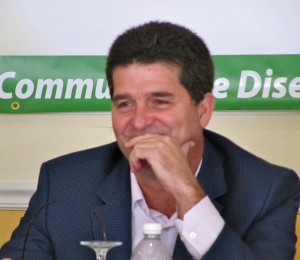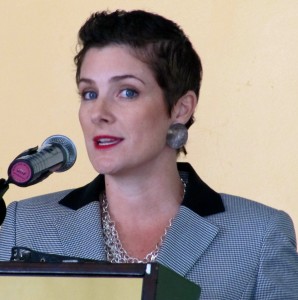
The MAJ: Battling a Medical Tsunami
February 17th, 2015
The Medical Association of Jamaica (MAJ) is a venerable institution. In fact, it is half a century old this year – the oldest professional organization in Jamaica. Last week it launched its week-long Golden Jubilee celebrations, to take place from June 7 – 14. The week will include a Gala, Banquet and Awards Ceremony on June 8 at the Jamaica Pegasus; and the MAJ’s annual symposium, this time with the theme “Chronic Non-Communicable Diseases: The 21st Century Tsunami,” with distinguished speakers from across the region.
“Tsunami.” Now, that’s a dramatic, if not frightening word. It jumped out at me from the MAJ’s banner. But there is no melodrama here – just the stark truth. What we also call “lifestyle diseases” are definitely “in style” in our modern world of stress and overwork, environmental pollution and sedentary habits. Almost three quarters of deaths from non-communicable diseases occur in lower-income countries, according to the World Health Organization. 82 per cent of deaths before the age of seventy from these diseases occur in low-income countries, too. Cardio-vascular disease (do we pay enough attention to it in Jamaica?) is the most common globally, followed by cancers, respiratory diseases and diabetes. Last year, Health Minister Dr. Fenton Ferguson called it an “epidemic” in Jamaica – and so it is. It must be if seventy per cent – yes, nearly three quarters – of Jamaicans die each year from non-communicable diseases and 34 per cent of those die before the age of seventy. This is, actually, a tsunami of epic proportions, and it seems to be growing.
One of the solutions, which the MAJ has already been working hard on, is to encourage healthy lifestyles (I noticed that there was a large dish of fruit for attendees at the launch, so it is “walking the talk.” Definitely no pastries in evidence!) “Chronic diseases are preventable,” stressed Professor Marvin Reid, the MAJ’s Vice President and Director of the Tropical Metabolism Research Unit at the University of the West Indies. And the MAJ – as President Elect Dr. Myrton Smith pointed out – is “not a trade union, nor a social club, but a lobby group.” As such, it has been seeking to sway hearts and minds through advocacy for a healthier lifestyle. Yes – we know, but it bears repeating. That means a healthy diet (cut down on sugars, etc); more, and more regular exercise; no smoking or drug-taking; cut down on alcohol. The MAJ has been advocating for health promotion (that wonderful word “wellness”) at policy level and plans to reach out across the island to persuade Jamaicans to change their unhealthy ways.
But here comes the well-worn phrase: “It takes cash to care.” A major public education program needs funding, so it is perfectly logical for the health sector is turning increasingly to the private sector for support. Guest speaker at the launch event was, fittingly, President of the Private Sector Organization of Jamaica (PSOJ) William Mahfood. By the way, his wife, nutritionist Deborah Chen heads the Heart Foundation of Jamaica.

The PSOJ’s William Mahfood: We can’t afford another “chik v.” The Wisynco Group which he heads is also celebrating its fiftieth anniversary this year.
And the health sector in general, as we know, is desperately under-funded. This is not just a Jamaican phenomenon. The struggle to provide affordable healthcare – and it is a struggle – is going on in “First World” and developing countries alike, right now. If I read another article about the steady decline in the UK’s National Health Service, I will burst into tears. So it was indeed gratifying to listen to Dr. Chandy Abraham, a close Caribbean neighbor and a major sponsor of the MAJ Golden Jubilee. Dr. Abraham is CEO of Health City in the Cayman Islands, a medical and surgical facility providing tertiary care in cardiac surgery, cardiology and orthopedics, which has big plans for expansion. Dr. Abraham stressed the need to “work together regionally,” noting that Health City recently provided free surgery for twelve Haitian children and a Jamaican child. The two other major sponsors are Scotiabank, which has donated J$300 million to the health sector since 1996 and has been a solid partner with the MAJ since 2010; and the simply wonderful National Health Fund, in which 378,000 Jamaicans are enrolled (including me and my husband, gratefully).

Debra Lopez-Spence, Vice President/Small & Medium Enterprises at Scotiabank, was the only woman on the head table, along with seven men…
But really, how are we going to manage? “How can we continue to sustainably fund healthcare, without incurring debt?” as Mr. Mahfood asked. As we have noted, huge efforts at prevention and health promotion are necessary. But according to the PSOJ head, “The Government of Jamaica has got to find a way to raise revenues.” Tax compliance is Mr. Mahfood’s major concern, and he stressed it again at the launch. I am sure you will hear him talking about it again on future occasions.
And what of the hated “chik v,” another epidemic that Jamaicans endured last year? “We cannot afford another ‘chik v’ again,” said Mr. Mahfood. We all mumbled our agreement. According to PSOJ research, last year’s Chikungunya virus outbreak created a J$6 billion loss to the Jamaican economy. In terms of productivity, the PSOJ calculated, we lost some thirteen million man-hours. In many firms, up to sixty per cent of staff were affected.
It’s quite clear, isn’t it. We can’t afford to be sick.
Tags: Caribbean, Chandy Abraham, chikungunya, health, Health City, Jamaica, Medical Association of Jamaica, National Health Fund, non-communicable disease, Private Sector Organization of Jamaica, Scotiabank, University of the West Indies, wellness, William Mahfood
The Gleaner reserves the right not to publish comments that may be deemed libelous, derogatory or indecent.
To respond to The Gleaner please use the feedback form.
8 Responses to “The MAJ: Battling a Medical Tsunami”
- We Are the Zoomers
- Living Online with Humans and Birds: NAOC 2020
- Human Trafficking and the Problem of Public Education
- Down Memory Lane
- Are We Ready to Recover from COVID-19?
- Road Safety Matters: Is Your Vehicle Safe?
- Sexual Harassment, Me Too, and the Minister’s Disturbing Giggle
- The Vulnerable Senior Citizens, Private Care Homes and COVID-19
- A Muddle Over Masks
- Here is Something Life-Saving You Can Do: Give Blood!




The statistics quoted on the burden of non-communicable diseases on Jamaica’s healthcare system are disturbing.. We need to take greater personal responsibility for our health!
Excellent initiative by the MAJ. The age old adage – prevention is better than cure definitely holds true!
This is an excellent initiative by the MAJ! As a people we need to be more vigilant in reducing the number of lifestyle related illnesses – beginning in the home!A healthy population is a productive one.
In January the MAJ hosted a workshop for members of the Caribbean Community of Retired Persons (CCRP) as part of their ‘Healthy Population’ campaign. Members turned out in their numbers to participate. The information given was useful, practical and most informative.
Thank you MAJ from the CCRP!
I think the outreach the MAJ is engaged in is admirable. It’s tremendously helpful to Jamaican citizens – simply sharing the information, answering questions, being available may actually save lives! A good preventive strategy, I believe.
Absolutely! Yes, we have to make changes in our own lives (me included!) Thank you for your comment, Latoya.
Yes, Vanassa – it just makes sense, doesn’t it. We shouldn’t wait until we get sick, and then panic. It’s never too early to start building healthy habits.
Yes, Jean – quite alarming aren’t they! Unless we start really taking responsibility, I am very much afraid they could grow worse. All the more reason to create a healthier lifestyle for ourselves. Thanks for your comment.